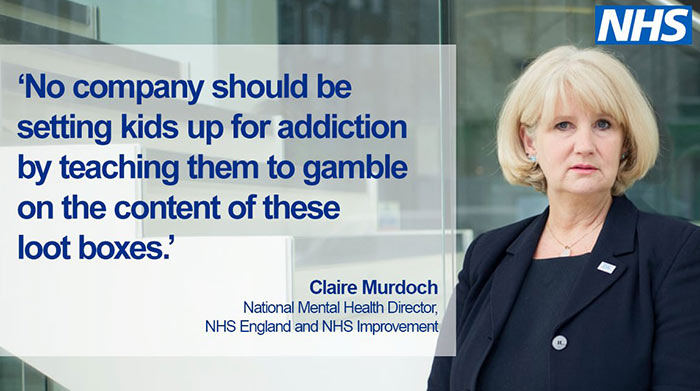In recent years and months HEXUS has reported upon the manoeuvring of video games companies with regards to loot boxes, and last October we saw the UK's NHS opening its first [video] gaming addiction clinic. The two issues might be tied quite closely, as loot boxes can be seen as a form of gambling, and this aspect adds some further super-addictive-sauce for people who are hooked on video games for one reason or another.
On Saturday the UK's NHS issued a statement on 'under the radar' gambling embedded in video games, and the effects this can have on the mental health of young people. In brief, the NHS mental health director, Claire Murdoch, has called on gaming companies to ban loot boxes from their products.
Murdoch asserted that "no company should be setting kids up for addiction by teaching them to gamble on the content of these loot boxes. No firm should sell to children loot box games with this element of chance, so yes those sales should end." Cooperation of video games publishing companies, supported by a ban by the UK authorities which certificate and allow distribution of video games, is important for the NHS as its new services available to families can't work alone. "Other parts of society must do what they can to limit risks and safeguard children's wellbeing," plead Murdoch.

Latest figures from the UK's Gambling Commission show 55,000 children are classed as having a gambling problem, and the NHS estimates there are around 400,000 people with a serious gambling problem in England alone. Unfortunately, the Gambling Commission does not regulate some loot boxes due to a loophole meaning they are not classed as gambling. The loophole involves games where no money can be cashed out - which is a simple but significant loophole in many popular titles.
To tackle the problem Murdoch proposed the following points for games companies to implement:
- Ban sales of games with loot boxes that encourage children to gamble
- Introduce fair and realistic spending limits to prevent people from spending thousands in games
- Make clear to users what percentage chance they have of obtaining the items they want before they purchase loot boxes
- Support parents by increasing their awareness on the risks of in-game spending
Other recommendations include; an industry levy for independent research into gaming side effects in the long term, and some new ways to keep children safely away from age-restricted platforms and games.
Meanwhile, for treatment more than prevention, up to 14 new NHS gambling clinics are planned across the UK.






